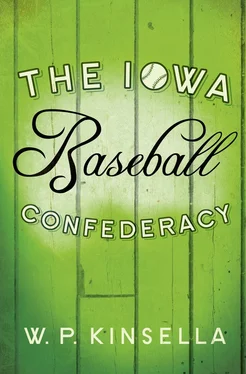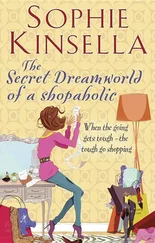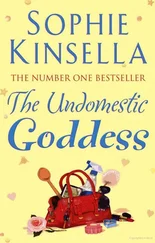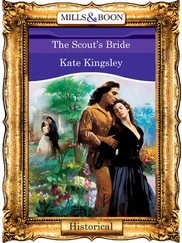But I did hear her prayers. We all did. John Baron would stand just inside the white-trimmed doorway, in the room where ballerinas forever danced on the wallpaper and where a bed with a ruffled canopy sat against a far wall. He wore bib overalls and a black-and-red checkered shirt, his white hair combed in a high pompadour, his face wide and windburned. He appeared slightly uneasy, as if he feared he might drip oil on something. Missy knelt by the bed, her nightgown a riot of black-eyed Susans, her hair still damp from her bath.
‘Now I lay me down to sleep,’ Missy said.
My tribulations. Wealth is a tribulation. I was happy enough before I had it; the insurance agency always earned enough to pay the taxes on the house and keep us in food and a new pickup truck every few years. The only thing I’ve done with my new wealth is a little advertising. You’ve probably seen the ads I’ve run in everything from the Christian Science Monitor to the National Inquirer . The small ads ask that anyone having memories or any kind of information concerning the Iowa Baseball Confederacy contact me at a P.O. box in Onamata. I receive a lot of religious tracts, offers to sell me Rhine Valley cuckoo clocks, pamphlets on numerology, brochures advertising trips to Hawaii, and instruction on how to become a Rosicrucian. I’ve also discovered that the peace movement is heavily into junk mail. So far, I’ve received polite letters from a number of baseball experts, real and imagined, who tell me the IBC never existed.
The way I became wealthy was this. My mother, Maude Huggins Clarke, married a man named Beecher, who, it turned out, was indeed related to the Wrigleys, the Chicago Cubs, and several million dollars. He died when I was nineteen and, inexplicably, left no will. My mother was about to inherit everything – he had no relatives close enough to raise legal objections – when the executors of his estate discovered that Mother had children from a previous marriage. Because of some quirk in Illinois law, Enola Gay and I became heirs to his estate – fifty percent went to Mother, twenty-five percent to each of us.
They have never been able to pay Enola Gay her share, for by the time the legal entanglements took their course, Enola Gay had embarked on her career as an urban guerrilla. I don’t know if Enola Gay is aware that I have barely touched my inheritance; I would guess she is, however. Late at night the phone will ring, and though I suspect it is Enola, I always answer just in case it is Sunny. Enola wants me to give her some of my money, or to claim her share, which I am apparently legally entitled to do, and then pass the money on to her. I am interested in doing neither. I doubt that she was very kind to my cat, Shoeless Joe, in his old age.
‘Live in fear, you bastard,’ Enola Gay said to me the last time she phoned. It must be frustrating for her to be so near that much money, to have a cause she wants to give it to, and yet not be able to get her hands on it.
‘I think the FBI has a tap on the phone,’ I said to Enola, and she hung up.
My share of the money was deposited in trust with a law firm in Iowa City. I signed a power-of-attorney form; they invest the money, pay my taxes, and keep me informed as to how wealthy I am. I can’t think of a single thing I want that all my wealth can buy me. I want:
(a) Sunny to love me enough to stay with me.
(b) To vindicate my father and myself by proving the existence of the Iowa Baseball Confederacy.
(c) To do something for Missy Baron.
It doesn’t surprise me that none of the items on my list requires great wealth.
The cat. I would hug him and he would hang down the front of me like a big orange bath towel. When he was hungry, he would rub around my ankles, nearly knocking me down. I think I learned some of my indifference from the cat. He demanded to be fed, or petted, let in, or let out. When he got what he wanted, he was disdain incarnate. When he didn’t, he could be as obsequious as a dog.
When he was content he would lie on his back and let me squeeze his front paws gently, feeling the moccasinlike pads, flexing his claws in and out. He was warm, and almost adoring, soft as the velvet pillows on the back of the sofa in the living room.
Enola didn’t like Joe. I have never understood why she took him with her when I was going on six years of age. If she hadn’t taken my cat, I would have claimed her money, put it in a suitcase in small bills, and left it for her in a garbage can in some suburban Chicago park on a rainy night. When I told her that, she spit curses in my ear and hung up.
The men who cleared and leveled the land to create a baseball diamond on the outskirts of Big Inning often saw, or thought they saw, flashing like a deer through the fluttering poplars beyond the outfield, the figure of a giant Indian .
He loped beyond the poplar grove, knees raised high, back bent forward as if he were performing some ritual dance or high ceremony. Sometimes, in the clean morning air, as they bent picking roots, they would hear his voice, yipping like a coyote or trilling a plaintive birdcall. Other times, they only felt his presence. Occasionally on a humid afternoon the men would stop what they were doing, notice the all-encompassing silence of the land, the trees, the nearby river. One of them would shiver, though sweat tracked in rivulets down his face and chest .
‘Someone just stepped on my grave,’ he would announce, and laugh self-consciously .
Someone else would say, ‘That damn Indian is somewhere close. I can smell his ornery hide, but I can’t see him.’
Everyone would stand still in the stifling afternoon and stare around them. Then a bird would squawk or a horsefly would bite or a frog would sing from the riverbank, and everything would be back in order just as if the moment of silence had never happened .
Drifting Away, who had been near enough to smell the white men’s sweat, near enough to reach out and touch their glistening wet backs, disappeared into the poplars, chuckling softly as a breeze .
‘Walt “No Neck” Williams, do you remember him?’ my friend Stan asks suddenly, in the way he has of jumping from subject to subject.
We are with our wives, driving back from a night game in Cedar Rapids.
‘Mm-hmm,’ I say noncommittally. ‘I know the name, but the details are fuzzy. He ended up playing in Japan, didn’t he?’
‘He played for the Sox. The White Sox. They called him No Neck because he didn’t have one.’ Stan laughs his long, stuttering laugh, sounding as if he has peanut shells lodged in his throat. There is a car following us closely and the headlights bury themselves in the rearview mirror, which then paints a moonlight-like bar across Stan’s face. As I glance across the front seat at him he looks as though he is wearing a golden mask.
‘Last summer I met No Neck Williams on the street in Chicago,’ Stan goes on. ‘I just about went crazy. “Hey, No Neck,” I called to him, and I set down my suitcases and went running after him.
‘You remember that, Gloria?’ He directs the last words at his wife, turning toward the back seat to acknowledge her, the mask of light slipping around his ear as he does.
Gloria is a big, blowzy Polish girl, cheerful and resilient. She has so far fouled off all the curves life has thrown at her, though I notice that her brows have squeezed together in a mini-scowl, as if she has been staring too long at the horizon.
‘He actually edged away from me. You remember that, Gloria? I guess you must meet a lot of nuts when you’re in the Bigs. I mean, I kept sayin’ to him, “Man, I used to watch you when you played for the Sox. You were great, man. You were great.” And I hauled out my wallet and looked for something he could sign, and I didn’t have any paper, not even a Master Charge slip or anything, so I got him to sign the back of Gloria’s picture. It’s one I’ve carried around for ten years, with Gloria in jeans and her hair up in a beehive, standing beside her old man’s ’69 Buick. No Neck looked at me like I was crazy, leaving my wife with our suitcases and chasing after him for a block like that. Don’t you remember him, Gid?’
Читать дальше












